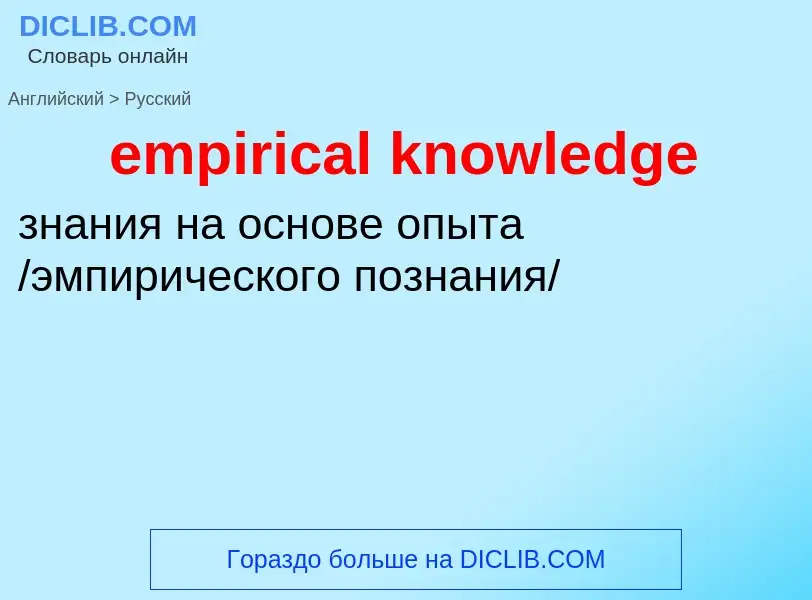Перевод и анализ слов искусственным интеллектом ChatGPT
На этой странице Вы можете получить подробный анализ слова или словосочетания, произведенный с помощью лучшей на сегодняшний день технологии искусственного интеллекта:
- как употребляется слово
- частота употребления
- используется оно чаще в устной или письменной речи
- варианты перевода слова
- примеры употребления (несколько фраз с переводом)
- этимология
empirical knowledge - перевод на русский
математика
эмпирические данные
эмпирический результат
математика
эмпирическое обоснование
математика
эмпирическое подтверждение
общая лексика
чувственное восприятие
математика
эмпирическое подтверждение
[im'pirik(ə)l]
общая лексика
эмпирический
синоним
прилагательное
общая лексика
недооценивающий теорию
узкопрактический
философия
эмпирический
опытный
основанный на опыте
придерживающийся эмпиризма
устаревшее выражение
знахарский
шарлатанский
Определение
Википедия
Empirical evidence for a proposition is evidence, i.e. what supports or counters this proposition, that is constituted by or accessible to sense experience or experimental procedure. Empirical evidence is of central importance to the sciences and plays a role in various other fields, like epistemology and law.
There is no general agreement on how the terms evidence and empirical are to be defined. Often different fields work with quite different conceptions. In epistemology, evidence is what justifies beliefs or what determines whether holding a certain belief is rational. This is only possible if the evidence is possessed by the person, which has prompted various epistemologists to conceive evidence as private mental states like experiences or other beliefs. In philosophy of science, on the other hand, evidence is understood as that which confirms or disconfirms scientific hypotheses and arbitrates between competing theories. For this role, it is important that evidence is public and uncontroversial, like observable physical objects or events and unlike private mental states, so that evidence may foster scientific consensus. The term empirical comes from Greek ἐμπειρία empeiría, i.e. 'experience'. In this context, it is usually understood as what is observable, in contrast to unobservable or theoretical objects. It is generally accepted that unaided perception constitutes observation, but it is disputed to what extent objects accessible only to aided perception, like bacteria seen through a microscope or positrons detected in a cloud chamber, should be regarded as observable.
Empirical evidence is essential to a posteriori knowledge or empirical knowledge, knowledge whose justification or falsification depends on experience or experiment. A priori knowledge, on the other hand, is seen either as innate or as justified by rational intuition and therefore as not dependent on empirical evidence. Rationalism fully accepts that there is knowledge a priori, which is either outright rejected by empiricism or accepted only in a restricted way as knowledge of relations between our concepts but not as pertaining to the external world.
Scientific evidence is closely related to empirical evidence but not all forms of empirical evidence meet the standards dictated by scientific methods. Sources of empirical evidence are sometimes divided into observation and experimentation, the difference being that only experimentation involves manipulation or intervention: phenomena are actively created instead of being passively observed.

